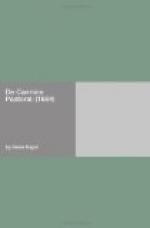Therefore let Pastoral be smooth and soft, not noisy and bombast; lest whilst it raiseth its voice, and opens its mouth, it meet with the same fate that, they say, an Italian Shepherd did, who having a very large mouth, and a very strong breath, brake his Pipe as often as he blow’d it. This is a great fault in one that writes Pastorals: for if his words are too sounding, or his sense too strong, he must be absurd, because indecently loud. And this is not the rule of an unskilful {54} impertinent Adviser, but rather of a very excellent Master in this Art; for Phoebus twitcht Virgil by the Ear, and warn’d him to forbear great Subjects: but if it ventures upon such, it may be allow’d to use some short Invocations, and, as Epicks do, modestly implore the assistance of a Muse. This Virgil doth in his Pollio, which is a Composure of an unusual loftiness:
Sicilian Muse begin a loftier strain.
So he invocates Arethusa, when Cornelius Gallus Proconsul of AEgypt and his Amours, matters above the common reach of Pastoral, are his Subject.
One Labor more O Arethusa yield.
Why he makes his application to Aretheusa is easy to conjecture, for she was a Nymph of Sicily, and so he might hope that she could inspire him with a Genius fit for Pastorals which first began in that Island, Thus in the seventh and eighth Eclogue, as the matter would bear, he invocates the Nymphs and Muses: And Theocritus does the same,
Tell Goddess, you can tell.
From whence ’tis evident that in Pastoral, tho it never pretends to any greatness, Invocations {55} may be allow’d: But whatever Subject it chooseth, it must take care to accommodate it to the Genius and Circumstances of a Shepherd.
Concerning the Form, or mode of Imitation, I shall not repeat what I have already said, viz. that this is in it self mixt; for Pastoral is either Alternate, or hath but one Person, or is mixt of both: yet ’tis properly and chiefly Alternate. as is evident from that of Theocritus.
Sing Rural strains, for as we march
along
We may delight each other with a Song.
In which the Poet shows that alternate singing is proper to a Pastoral: But as for the Fable, ’tis requisite that it should be simple, lest in stead of Pastoral it put on the form of a Comedy, or Tragedy if the Fable be great, or intricate: It must be One; this Aristotle thinks necessary in every Poem, and Horace lays down this general Rule,
Be every Fable simple, and but one:
For every Poem, that is not One, is imperfect, and this Unity is to be taken from the Action: for if that is One, the Poem will be so too. Such is the Passion of Corydon in Virgil’s second Eclogue, Meliboeus’s Expostulation with Tityrus about his Fortune; Theocritus’s Thyrsis, Cyclops, and Amaryllis, of which perhaps in its proper place I may treat more largely.




